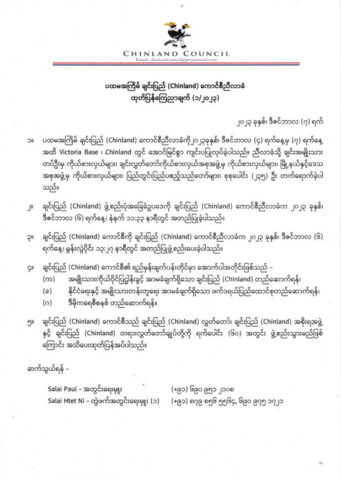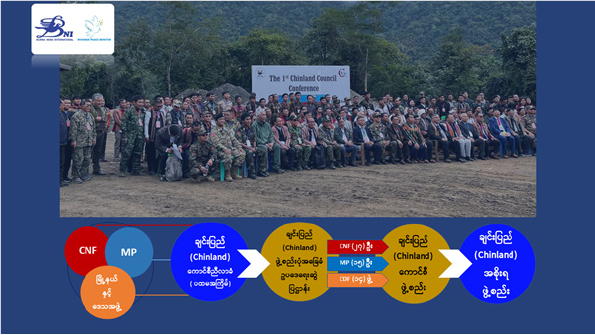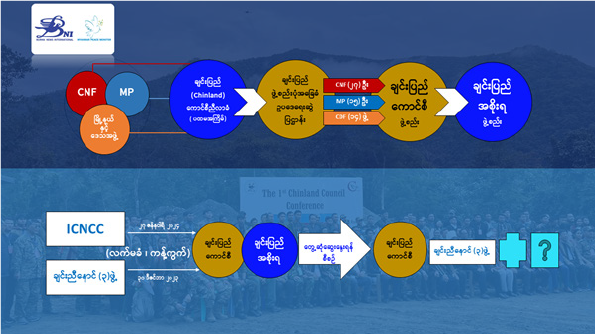
Introduction
The military-political dynamics in Chin State over the course of the Spring Revolution have been a mixture of challenges and opportunities. The ethnic and tribal diversity within the Chin State underscores the beauty of the region, while the coordinated resistance actions against the military junta over the past three years by armed resistance groups and political organizations across Chin State to end military dictatorship and build a federal democratic union have posed a formidable threat to the Myanmar’s military regime.
However, there remain significant disagreements among the various stakeholder groups in Chin State that oppose the military council, including armed resistance groups, political organizations, civil society organizations and others, as evidenced by the formation of the Chinland Council and Chinland government. Whether these differences will destroy the symbol of beauty and unity of the Chin State depends primarily on the choice and ability to resolve of all forces within the Chin State.
In this issue of Burma News International (BNI) – Myanmar Peace Monitor Bi-Weekly News Review, we take a look at the military-political dynamics in the Chin State over the course of the Spring Revolution by examining the various groups in Chin State and their ambitions based on their existence.
Understanding the Chinland Council and Chinland government
The first Chinland Council Conference, held at the headquarters of Camp Victoria from 4 to 7 December 2023, was attended by 235 people from three clusters – the Chin National Front (CNF), Chin MPs and township and regional groups – as well as guests from home and abroad.
On the third day of the conference, 6 December, the Chinland Council Conference ratified the Chinland Constitution in the morning and established the Chinland Council in the afternoon. The Chinland Council has set three goals: to build a Chinland that guarantees the right to self-determination, to build a federal union that guarantees political and national equality, and to build a democratic system. The post-conference statement published on 7 December 2023 states that the Chinland Parliament, the Chinland Government and the Chinland Supreme Court must be formed within 60 days of the formation of the Chinland Council. 1

According to the 2023 Chinland Constitution, the 140-member Chinland Council is to be formed with 27 MPs elected in the 2020 general election who are participating in the revolution against dictatorship, 27 representatives from the Chin National Front (CNF) and 86 representatives from township and regional groups. The 23-member steering committee of the Chinland Council is to be composed of three representatives from the Chin National Front, three Chin MPs and 17 representatives from township and regional groups, structuring with a chairperson, a vice chairman-1, a vice chairman-2, a secretary, a joint secretary-1, a joint secretary-2, and other council members. 2

The current Chinland Council includes 27 representatives from the Chin National Front, 15 Chin MPs, and representatives from 14 township and regional groups. The 14 township and regional groups include (1) Kalay, Kabaw, Gangaw-KKG, (2) CDF-CDM-Siyin, (3) CDF- (3) CDF- Hualngoram (4) CDF-Hakha, (5) CDF- Thantlang, (6) CDF- Zophei, (7) CDF-Lautu, (8) CDF-Zotung, (9) CDF-Mara, (10) CDF-Daai, (11) CDF-Paletwa, (12) CDF-Tonzang, (13) CDF-Kanpetlet, and (14) CDF-Matupi, according to Salai Paul, Secretary of the Chinland Council. 3
Background
Looking back over the three years of the Spring Revolution against the military coup on political and military fronts, the combined strength and unity of all stakeholders, including the Chin National Front, elected MPs, the locally formed Chinland Defense Forces (CDFs), participants in the strike movements and the Civil Disobedience Movement (CDM), greatly shook the military council.
The Chin National Front (CNF) has been consistently cooperating with the with the National Unity Consultative Council (NUCC) and the National Unity Government (NUG). In addition, it was also a member of Interim Chin National Consultative Council (ICNCC) formed on 13 April 2021. In May 2021, the NUG and the CNF signed a bilateral agreement to resist the military regime and build a federal democratic system.
The CNF also played a leading role in the Chin Joint Defense Committee (CJDC), which was established on 30 September 2021 together with 17 Chinland Defense Forces. In September 2022, a coordination committee was formed between the ICNCC and the CJDC for a Chinland charter/constitution and the establishment of a Chinland government. In April 2023, the CNF withdrew from the ICNCC and in May 2023, some elected MPs within the ICNCC began talks to form a Chin state government. 4 In September 2023, a pre-plenary conference for the Chinland Council was held and the Working Committee for the Chinland Council Conference (W4C) was established. Then, in December 2023, the Chinland Council Conference was held, at which the Chinland Constitution was ratified, the Chinland Council was formed and the Chinland government was established, marking a significant political change in Chin State in a short period of time.
In other words, it appears that the consolidation, leadership, and ability to cooperate among the ICNCC member groups, which were established to resist the military regime and build a Chinland that guarantees the right to self-determination as well as a federal democratic union that guarantees equality, have become questionable and need to be reassessed.

The Interim Chin National Consultative Council (ICNCC) issued a statement on 3 February 2024 in which it did not recognize and rejected the formation of the Chinland government formed by the Chinland Council. Some remaining Chin MPs in the ICNCC also issued a statement on 14 February opposing the formation of the Chinland Council and the Chinland government.
The Chin Brotherhood Alliance consisting of the Zomi Federal Union (ZFU), the Chin National Organization/Chin National Defense Force (CNO/CNDF) and the Chin National Council (Mindat) also rejected the formation of a Chinland govern-ment in a joint statement. According to Dr. Sui Khar, Vice chairman-3 of the CNF, spokesperson of the Chinland government and the foreign affairs minister, there is an agreement between the three Chin Brotherhood Alliance and the Chinland Council to meet and discuss in the first week of March.5
Review
Although the military momentum in Chin State have posed a formidable threat to the military regime over the three-year Spring Revolution, the political shifts have revealed clear differences among the various groups. It is very important that all stakeholders, who are in the same boat with the determination to end all forms of tyranny, including military dictatorship, and build a federal democratic union, should respect each other, be magnanimous and urgently find a solution through dialogue for the sake of the people of Chin State.
Currently, local Chinland defense forces control up to 80% of Chin State, which has a population of only about 500,000 across nine townships. If the political disagreements can be resolved in time, the beauty and unity of Chin State will shine even brighter. At the same time, it could become a good lesson for potential ethnic conflicts and territorial disputes in other states and regions.
1 Statement of first Chinland Council Conference (1/2023)
2 Chinland Constitution (2023), Chapter (3)
3 Interview with Salai Paul, Secretary of the Chinland Council on future work processes
4 Statement of exhortation to Chin revolutionary groups and people of Chin State on Spring Revolution’s 3rd anniversary
5 Interview with Chinland government’s spokesperson and CNF’s vice chair-3 Dr. Sui Khar
